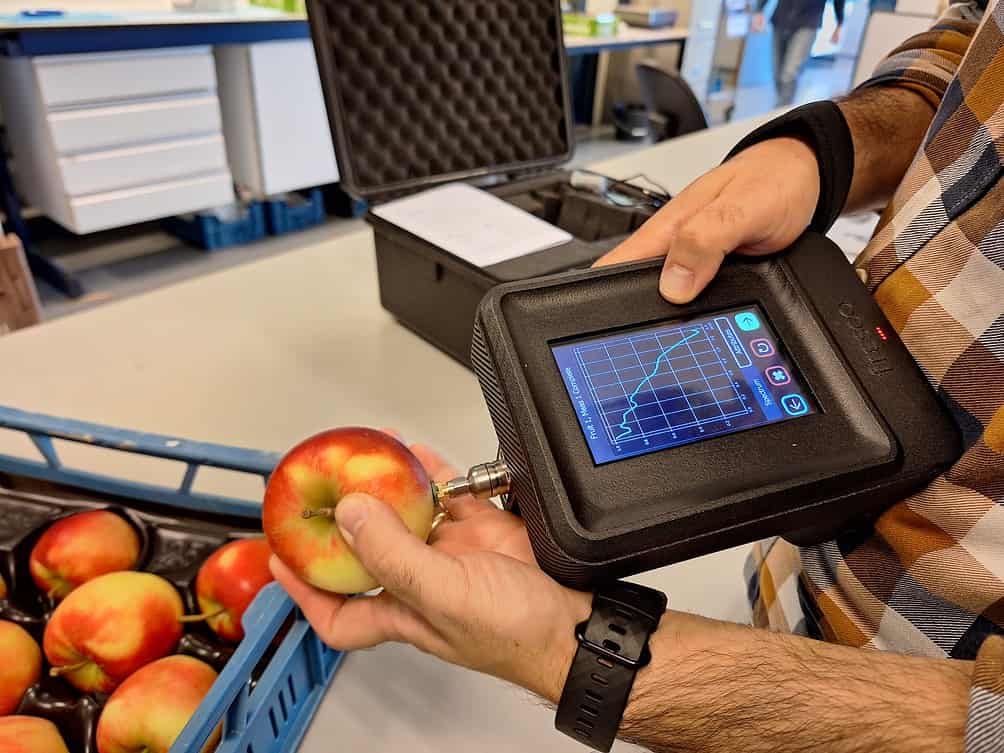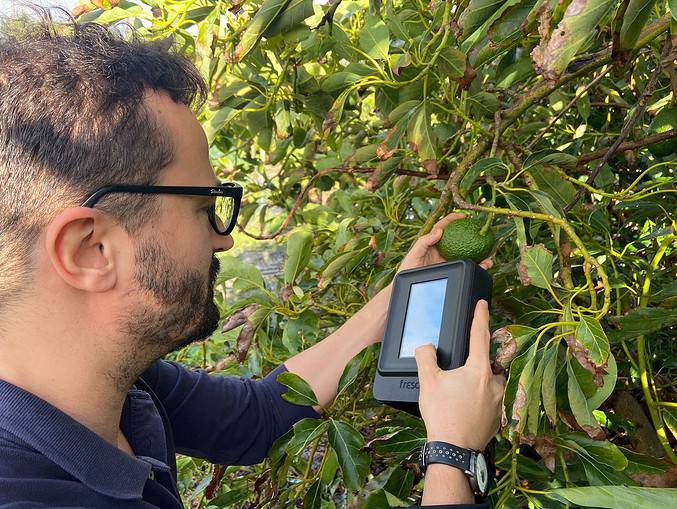Microwaves are excellent at warming up your leftovers, but they can do much more. For instance, they can also assess the fruit's internal quality.
Founded in 2017, Vertigo Technologies develops microwave and millimeter wave testing solutions. Initially born to offer solutions for the testing of electronic devices, the company now also caters to the agrifood sector, providing a non-invasive solution to test fresh fruit. “We noticed that there was a need for solutions like ours, so we started developing the first prototypes, and we’re now about to launch our product line, FRESCO,” says Luca Galatro, CEO of the company.
Assessing fruit’s quality in a second
Knowing fruits’ internal condition is essential to understanding the ripeness, the shelf life, or the flaws of the produce. Currently, to check the condition of a batch of fruit, produce is cut, squeezed, and weighed. Decisions are made based on the acquired information; if quality is insufficient, a batch might be thrown away or end up in a secondary market. “Since fruit needs to be cut, samples must be minimal; there’s little room for error. Let’s take a batch of mangoes; if out of ten, one is rotten, the incidence is already high,” underlines Galatro.
The handheld device of the FRESCO product line (FMS-H), following the push of a button, can scan fruit and assess its internal quality. Through microwave sensing, the scanner creates an electromagnetic field inside the fruit. The generated field interacts with the fruit’s pulp, and the device’s sensor measures this interaction, telling the user about the internal condition of that pome.
Through the check, FMS-H can get all the information about the ripeness of a fruit. For now, the product can only assess the qualities of avocados and mangoes, but Vertigo is working to expand the range of analyzed fruits. Possibilities are being explored in pilots conducted with the Wageningen University and other Dutch and Belgian private partners.
From circuits to mangoes
Being headquartered in Delft helps to get in touch with the players of the fruit value chain. Given the proximity to Rotterdam’s harbor, many of the main European fruit importers, wholesalers, and growers operate there. Understanding the scalability potential of this use case made Vertigo pivot. Nevertheless, the electronic devices sensing business unit allowed the spinoff to explore the fruit use case.
“Our device sensing product is a cutting-edge solution,” the CEO states. “Yet, this product line caters to a niche market, which includes companies developing next-generation telecommunication devices or research centers.” Galatro pursued his Ph.D. at the TU Delft. Parallel to his work, he joined another research initiative, of which Vertigo was born. Being familiar with the world of electronic devices, the group developed a product for this specific market. Then, another university project that was exploring the possibilities of using microwave sensing for agrifood use cases was incorporated.
“This experience at YES!Delft was the first and the most impactful one. Me and my co-founder Raffaele – Raffaele Romano, CTO of the company ed. – have a technical background; we had no idea how to launch a product on a new market. Understanding the product market fit and the right approach to enter a new space is key,” Galatro underscores.
By getting in touch with the sector’s stakeholders, the users’ needs get clearer for those who develop the technology. Vertigo, for instance, was initially opting for another device format, then pivoting to a handheld solution, given the ease of use. Reaching the market and taking even the tiniest details for granted makes a world of difference for a small company.
Scanning all of the world’s fruit
Eyeing European and global expansion, Vertigo also joined other development programs. The TU Delft spinoff is also part of StartLife’s portfolio – an agrifood accelerator program – and joined the EIT Food network – the European Institute of Technology food-tech accelerator. More knowledge and network are the main takeaways of these experiences as the company approaches the market.
“Our goal is global expansion. FRESCO has the most significant impact in the growers' segment. Given the fruits the device can now analyze, South America is one of the main targets,“ he explains. As more pilots are conducted and more fruits are studied, the device will find more use cases in Europe. With sales, Vertigo hopes to get the ball rolling and conquer more markets one fruit at a time.





